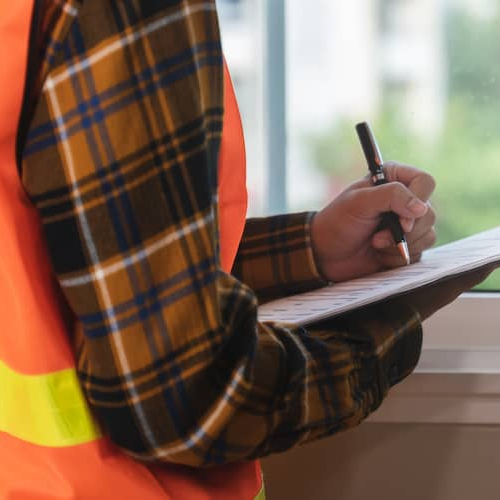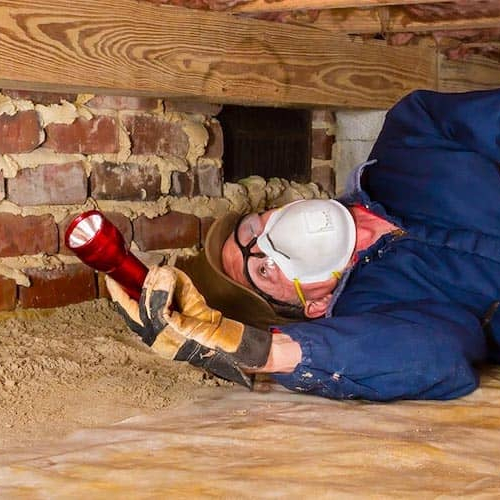What does a home inspector do?
Contributed by Tom McLean
May 30, 2025
•6-minute read

A home inspector is a third-party professional who examines a property and provides a detailed report on its condition. If any aspect of the home is unsafe or major systems, such as the plumbing or electricity, are in poor condition or require repairs, the inspector will notify you. While it’s not required, a home inspection can help you understand exactly what you’re buying. You can use inspection results to ask the seller to make repairs or discount the price.
What areas does a home inspector look at?
Home inspectors thoroughly check the inside and outside of a home, looking for any problems or defects that may require repairs. Here are the common parts of a home that an inspector reviews, along with some common issues they look for.
Basement and attic
Home inspectors should check basements for moisture, cracks, leaks, or other warning signs of foundation issues. Likewise, they should inspect attics to ensure that all vents and structural elements are in good condition and functioning properly. A poorly ventilated attic can lead to high energy bills and premature roof damage.
Electrical system
Your inspector should verify that all wiring is safe and properly installed.
Plumbing
Home inspectors look for leaks, sufficient water pressure, or drainage problems. Common problems include corroded or leaking pipes, clogged drains, and outdated or toxic materials that don’t meet current standards. Inspectors also make sure the water heater works, check for signs of water damage, and verify adequate ventilation to prevent mold growth.
Bedrooms
Inspectors should make sure all windows and doors are working correctly. They’ll also look for uneven floors or ceilings with exposed cracks or stains that could indicate a more significant issue. They also test light switches and outlets to ensure they function correctly.
Bathrooms
The inspector should make sure sinks, toilets, and showers are all working and draining properly. Inspectors will be on high alert for signs of water damage or any visible leaks. They should verify that bathrooms are adequately ventilated to prevent mold or mildew.
Kitchen
The home inspector will make sure the appliances work as intended. This includes ovens, sinks, and garbage disposals. They’ll also look for proper ventilation and any signs of damage, such as water drippings, cracks, or stains.
Heating and cooling systems
A home inspector evaluates the heating, ventilation, and air conditioning systems to ensure they work efficiently and safely. Common problems include dirty or clogged filters, malfunctioning thermostats, refrigerant leaks, or worn-out motors. They also check for signs of inadequate maintenance that could affect energy efficiency and indoor air quality.
Home exterior
Outside the home, the inspector will assess its structural integrity, weather resistance, and overall condition. Common problems include cracked or deteriorating siding, damaged roofing or gutters, and poor drainage, which can lead to foundation problems. Inspectors also look for signs of wood rot, pest infestations, and improper sealing around windows and doors, which can result in energy loss or water leaks.What areas don’t home inspectors look at?
While it may sound like a home inspector checks every part of the home, they typically don’t inspect individual appliances in detail or assess simple cosmetic defects. Additionally, inspectors do not evaluate aspects of a home that require specialized knowledge or invasive inspection, such as:
Pools and hot tubs
Inspectors may check for visible damage, but they do not test pumps, heaters, or chemical balance because these require a pool specialist.
Solar panels
They do not assess solar panel efficiency or electrical connections because this requires a licensed solar technician or electrician.
Fireplaces
While they may check for obvious damage, they do not inspect internal chimney conditions or creosote buildup, which require the services of a chimney sweep or specialist.
Underground pipes
Inspectors cannot see or assess buried plumbing lines for leaks or blockages without specialized camera equipment.
Septic system
They do not evaluate the tank’s condition, drainage field, or sludge levels, as this requires a professional septic inspection.
Inside walls
Hidden wiring, plumbing, insulation, or structural damage cannot be assessed without invasive methods, such as opening walls, which inspectors are not permitted to do.
This doesn’t mean a home inspector won’t look at these parts of your home, but they might not be knowledgeable enough to do so safely. You may need to hire an inspector with specific qualifications and experience to review these areas. Additionally, home inspectors may be unable to detect the presence of toxic materials, such as asbestos, in the home.
What do special home inspectors look at?
A special inspection reviews aspects of your home not included in a basic home inspection checklist because they require specialized knowledge, tools, or testing methods.
Special home inspections might include:
- Chimney inspection. Checks for creosote buildup, structural damage, blockages, and proper ventilation to prevent fire hazards and carbon monoxide leaks.
- Septic system inspection. Evaluates the tank, drain field, and sludge levels to ensure proper waste management and prevent costly failures.
- Sewer inspection. Uses cameras to detect blockages, leaks, root intrusion, and pipe deterioration in underground sewer lines.
- Soil inspection. Assesses soil composition, drainage, and stability to identify risks like erosion, foundation shifting, or poor water absorption.
- Lead-based paint inspection. Tests for lead in older homes are important, as exposure can cause serious health issues, especially for children.
- Radon inspection. Measures levels of radon, a radioactive gas that can seep into homes and pose long-term health risks like lung cancer.
- Mold inspection. Identifies hidden mold growth and moisture issues that can lead to structural damage and respiratory health problems.
- Termite inspection. Detects wood-destroying insects and assesses structural damage that could compromise the home's integrity.
What are home inspectors not allowed to do?
A home inspector is not required to inspect every aspect of your home, and some areas they are prohibited by law from reviewing. Buyers should understand these limitations to ensure they hire an inspector with the right expertise and integrity.
While laws vary by state, here are some things inspectors aren’t allowed to do:
- Home inspectors aren’t allowed to diagnose the cause of any problems found during the inspection.
- An inspector can’t offer construction or contractor services to repair any issues revealed during the inspection or recommend another company.
- Certified real estate inspectors can’t put their safety at risk when inspecting a property.
- Certified inspectors can’t withhold information about hazardous conditions or continue an inspection in dangerous situations.
- Inspectors aren’t allowed to perform construction on the home to search for potential problems.
How to find a home inspector
Typically, the home buyer pays the home inspection costs, so finding a home inspector you trust is important. Your real estate agent may suggest inspectors, or you can ask family and friends if they have worked with an inspector they had a good experience with.
Alternatively, you can do your own research to find an inspector. Consider asking questions like:
- Are you licensed or certified? By which organization? Most states require inspectors to have a license, but 14 do not: California, Colorado, Georgia, Hawaii, Idaho, Iowa, Kansas, Maine, Michigan, Minnesota, Missouri, Nebraska, Utah, and Wyoming.
- What types of homes or real estate properties do you typically inspect?
- How long have you been inspecting homes?
- Do you have any certifications relevant to home inspections in my area?
- What does your standard inspection cover, and what is not included?
How to prepare for a home inspection
Since home inspectors check many systems and features, it’s essential to be prepared.
As a home buyer
If you’re on the fence about buying a home, or your offer includes a home inspection contingency, prepare by doing the following:
- Write a list of questions regarding anything you’ve noticed in the house that concerns you.
- Attend the inspection so you can listen to the inspector and ask follow-up questions.
- Review the seller’s disclosure to compare any disclosed issues with the inspector’s findings for a complete picture of the home’s condition.
As a home seller
The seller can physically and mentally prepare for a home inspection as well. Here’s how:
- Provide the inspector with any important documentation regarding the home, such as records of past issues or repairs.
- Move furniture out of the way so the inspector has access to everything in the home, including attics, basements, electrical panels, and HVAC units.
- Provide any keys or codes the inspector will need to access all parts of the property.
- Before the inspection, make minor repairs, such as fixing leaky faucets, tightening loose handrails, or replacing missing light bulbs, to help make a good impression.
The bottom line: Real estate inspections let you close with confidence
When buying a home, an inspection report should give you a good idea of its condition. Inspectors don’t cover everything, but they can provide you with peace of mind as you move into homeownership. Work with your real estate agent to ensure you hire a home inspector who’s certified and experienced in the necessary areas.
Ready to finance your dream home after a stellar inspection report? Start the mortgage process today.

Jamie Johnson
Jamie Johnson is a Kansas City-based freelance writer who writes about a variety of personal finance topics, including loans, building credit, and paying down debt. She currently writes for clients like the U.S. Chamber of Commerce, Business Insider, and Bankrate.
Related resources

6-minute read
What is a 4-point inspection?
A 4-point inspection looks at a property's four major systems. Learn more about what a 4-point inspection is and why you may need one before purchasing a home.
Read more

6-minute read
What is a seller’s pre-inspection?
As a seller, you might order a pre-inspection before listing your home to address any repairs and help prevent negotiations with buyers. Find out how it works.
Read more

9-minute read
The final walk-through: Checklist of what to look for
Our final walk-through checklist can help secure your peace of mind before closing. Verify repairs and ensure your new home is move-in ready.
Read more